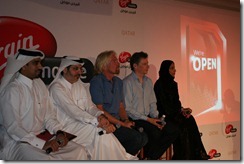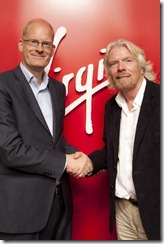The Middle East’s pre-eminent MVNO, Friendi Group has agreed to merge operations with Virgin Mobile South Africa, with the combined entity set to pursue opportunities across the Middle East and Africa. Such a tie-up will be the ultimate litmus test as to whether a hereto underperforming business model can find wide scale success in the region
Branson attending the ill-fated launch of Virgin Mobile in Qatar in 2010
Friendi Group (then Friendi Mobile) sprang onto the scene in 2006 with the view to introducing and pushing forward the mobile virtual network operator (MVNO) model in the Middle East and beyond. Having scored some early success and launching operations in Oman and Jordan, a kind of MVNO apathy developed in the region with many national telecom regulators expressing an interest in the business model, but none effectively converting the interest into the licensing of such players.
In 2010 Qtel in Qatar attempted to take a short-cut by introducing the Virgin Mobile brand in the country, without the Virgin Group company having been granted the requisite operating concession. Qtel attempted to pass Virgin Mobile’s presence in the market as merely a marketing and branding extension, but the national telecom regulator ictQatar did not see it that way and within 18 months, the Virgin Mobile brand and its operations were shut down.
Thus the agreement announced between Friendi Group and Virgin Group for the latter to collapse its 55 per cent stakeholding in Virgin Mobile South Africa into Friendi Group’s pool of activities, which include the operation of a ‘B-brand’ in Saudi Arabia alongside its MVNOs in Oman and Jordan, is significant in a number of ways.
Firstly, Virgin Mobile South Africa, despite having been established in 2006, the same year as Friendi Mobile, is still unprofitable though it counts a subscriber base of approximately 400,000 users and a high amount of brand visibility. Cell C itself, the mobile network operator that was initially a 50 per cent shareholder in Virgin Mobile South Africa, and over whose network the MVNO operates, took an incredibly long seven years to turn its first operational profit in 2008.
“Yes, there are still losses at Virgin Mobile South Africa, but I think what is required are some structural changes and tweaks, which I believe can turn the operator around quite quickly,” Mikkel Vinter, founder and CEO of Friendi Group told Comm. The combined Friendi Group/Virgin Mobile South Africa entity will be known as Virgin Mobile Middle East and Africa (VMMEA), and will be headed up by Vinter from his Dubai base.
“Virgin Mobile South Africa is a good business with a large pool of talented individuals; it is a real asset to VMMEA,” Vinter said. Virgin Mobile South Africa employs approximately 250 staff and it was announced at the time of Friendi Group’s arrival, that the company’s CEO, Steve Bailey is stepping down, to be replaced by a “highly experienced candidate.”
If there was an MVNO that could make a commercial success of Africa in general and South Africa in particular, it would have been Virgin Mobile, given its strong brand associations and experience in operating such ventures across the globe. However, South Africa and Africa have been challenging propositions to date, and it remains to be seen whether VMMEA’s main growth engine will be the continent of Africa or the Middle East.
Beyond its stake in Virgin Mobile South Africa, Virgin Group also contributed a cash amount to the deal with Friendi Group, with the combined MVNO group announcing a subscriber base of one million subscribers. VMMEA is ambitiously looking to raise this base to over five million subscribers by 2015 across both the Virgin Mobile and Friendi Mobile brands across continents.
“We are obviously pleased to have reached this agreement with Virgin Group, which I believe comes at an opportunistic time with respect to the development of MVNOs in our region,” Vinter said. “With large markets such as Saudi Arabia and Egypt moving towards the implementation of MVNOs this is a fantastic time for the region’s most recognised and experienced players to come together and offer the best services available.”
In December, a spokesman for the Saudi Communications and Information Technology Commission (CITC) confirmed the regulator would offer MVNO licences this year, but did not provide more details.
There is likely to be strong demand for MVNO concessions in large markets such as Saudi Arabia. Earlier this year, Liudvikas Andriulis, chief marketing officer of Belgium-based mobile virtual network enabler (MVNE) Effortel told Comm. that there were enormous benefits to be had from being able to operate several MVNOs from a single platform, and that he believed there remained a great deal of opportunity for such players in the Arab world.
“We are looking forward to developments in Saudi Arabia in this respect, for example, and even beyond the Gulf region, markets such as Pakistan are of great interest,” Andriulis said.
Effortel has 10 MVNOs running on an end-platform that is based in Brussels, including three MVNOs in joint venture with Carrefour (Carrefour Mobile Belgium, Carrefour Uno Mobile Italy and Carrefour Telecom Taiwan), as well as providing MVNE services to Carrefour Mobile Mova and FM Group Mobile in Poland, Daily Telecom in Italy and Samatel in Oman.
In January, a company called BLADNA, which means ‘homeland’ in Arabic, announced the commercialisation of activities as an MVNO in Italy, focused on the North African community living in the country. The company, which is a subsidiary of Vodafone Egypt, said it would cater for the growing North African community in Italy comprised mainly of Egyptian and Moroccan nationals.
Segmentation, or at least targeting a specific segment of the cellular markets in which the company operates will have to remain a key strategic driver for VMMEA, with Vinter having explained that the Friendi Mobile brand and the Virgin Mobile brand shall remain distinct and shall be used interchangeably depending on the nature of the markets they enter.
Vinter said that should the company target the youth segment in a new market, VMMEA would likely utilise its Virgin Mobile brand, given its association with younger and supposedly trendy subscribers. Vinter believes Friendi’s brand strength lies with its association with specific expatriate ethnicities or nationalities in a given market, and should that be the go-to-market strategy in a certain circumstance, the Friendi Mobile brand would likely be utilised.
It is telling that while South Asia has been on Friendi Group’s radar, the agreement with Virgin Mobile is strictly rooted in the Middle East and Africa. In 2009 Friendi entered a collaboration agreement with Axiata Group (formerly known as TM International) with the intention of the two companies working together to address the communications needs of expatriates living in the markets Axiata and Friendi operate in.
Amongst the areas of cooperation that were to be explored was the possibility of setting up co-branding and MVNO relationships between the two groups. The terms of the agreement also included a review of the provision of content and services.
The first concrete outcome of the deal was a linkup between Axiata’s affiliate in India, Idea Cellular, and the local Friendi operation in Oman to provide the customers in countries better and more affordable communication services. 
Axiata is one of the largest Asian telecommunication companies, focused in high-growth low penetration emerging markets, with controlling interests in mobile operators in Malaysia, Indonesia, Sri Lanka, Bangladesh and Cambodia; and significant strategic stakes in India, Singapore and Iran.
Mikkel Vinter and Richard Branson believe the interests of Friendi and Virgin Mobile are better served together rather than apart
Virgin Mobile’s experience in Asia has been less auspicious, with the company having had to withdraw from the Singapore market back in 2002, having found it challenging to gain market share in the highly competitive cellular landscape. During that year, Virgin Mobile also disbanded its Asian management team, which was headed by Ross Cormack, and had been responsible for cost-effectively expanding Virgin Mobile’s services in the region.
Coincidentally Cormack went on to become CEO of Nawras mobile operator in Oman, which hosts a number of MVNOs on its network, but not Friendi Mobile’s operation in the country, which is hosted by rival Oman Telecom.
Speaking to Comm. last year, Vinter indicated that Friendi Group had set a course to seek a public listing within the coming 2-3 years, having secured an amount of US$25 million in third round investor funding earlier in 2011. The funding consisted of US$10 million equity from new and existing shareholders, plus a US$15 million structured debt facility from Standard Bank. At the time Vinter said the investment was aimed at further accelerating expansion plans across the Middle East, Africa and Asia, with the financing permitting the company to enter into a further 3-4 markets, which Vinter was keen to see happen before considering a move to IPO in the 2012-2014 timeframe.
Given Virgin Group’s track record of successful initial public offerings (IPO) of numerous companies under its umbrella, Vinter said he believed the company’s participation in VMMEA’s equity would actually reinforce the MVNO’s IPO drive.
“We need to build the business further, enter some new markets and build up our subscriber base before we start thinking along those lines,” Vinter said. “But as and when the time should come to look at listing options, Virgin Group’s experience and participation will be invaluable.”
Virgin Group operates Virgin Mobile-branded MVNOs across eight countries including South Africa, and the agreement with Friendi Group will see the diversified conglomerate become the single largest shareholder in the combined VMMEA entity, with a significant minority share.
Virgin Mobile South Africa was launched as a 50:50 joint venture between the Virgin Group and local mobile operator, Cell C. However, in February 2011 Cell C sold its stake, with Virgin Group picking up an additional five per cent and Calico Investments of the Bahamas acquiring the remaining 45 per cent.
Selected MVNO performance in MEA
|
MVNO (country, founding year |
Current MVNO regulatory framework |
Market entry opportunity |
Entry strategy |
Challenges |
Operation success/failure |
|
Virgin Mobile (India, 2008) |
Unrestricted |
Youth segment |
Retail Innovations including free air time for each incoming call |
Innovations were not sustainable in the long-term |
Simple pricing plans Excellent customer care Research-driven marketing & demand analysis |
|
Renna Mobile |
Unrestricted |
Unreached ethnic segment |
Prepaid retail service Low international calling tariffs Lowest SMS rates |
Launched within the same time space as Friendi Mobile and they compete in the same market |
Deployed own provisioning and billing hardware Various pricing plans thereby increasing choices for subscribers Extensive retail system (4,000 outlets) |
|
Touba Mobile (Senegal, 2011) |
Unrestricted |
Mass-market |
Free MVNO to MVNO calls Cheap calls to non-MVNO numbers |
Cannibalisation of MNO subscribers may lead to conflicts with MNOs |
Partnership between two strong, local brands (Sonatel and Kirene) Touba refers to a religious city in Senegal |
|
Econet (South Africa, 2009) |
Unrestricted after carrier pre-select regulation provisions were passed |
Zimbabweans living in South Africa |
Low cost calls to Zimbabwe from South Africa (use of call home SIMs) |
Relatively small subscriber base Little room for expanding VAS |
500,000 lines in 12 months Loyal customer base |
|
Virgin Mobile (South Africa, 2006) |
Unrestricted after carrier pre-select regulation provisions were passed |
Post-pay/higher ARPU bracket Prepaid cheap & easy pricing |
Higher income post-pay |
100 per cent market penetration Higher interconnection fees to ‘rival’ MNOs |
Leveraging the Virgin brand Excellent customer care Failed to achieve desired 10 per cent market share |
Source: Mind Commerce





0 comments ↓
There are no comments yet...Kick things off by filling out the form below.
Leave a Comment